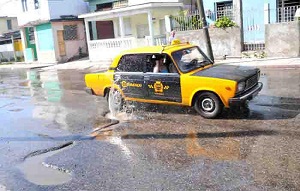 Havana has not escaped the current drought affecting the entire country, given that its total reservoir capacity stands at 35%. As a consequence the city has 1,595 liters of water per second (L/s) less than necessary. Some 48,194 residents have reported problems with their water supply, with Old Havana, Central Havana and Bo yeros the three worst affected municipalities.
Havana has not escaped the current drought affecting the entire country, given that its total reservoir capacity stands at 35%. As a consequence the city has 1,595 liters of water per second (L/s) less than necessary. Some 48,194 residents have reported problems with their water supply, with Old Havana, Central Havana and Bo yeros the three worst affected municipalities.
The aforementioned figures, in addition to others, were analyzed on August 26, in a meeting held at the Party provincial headquarters in the capital to review the Havana drought management and mitigation program.
The encounter, presided by Mercedes López Acea, first secretary of the Party Provincial Committee in the capital – with the participation of Inés María Chapman Wong, president of the National Institute of Water Resources (INRH) and the organization’s head of division, Ramón Pardo Guerra, also head of Civil Defense General Staff – brought together the main Party and government authorities from the province’s 15 municipalities, as well as representatives from various associations.
Javier Toledo Tápanes, INRH representative in Havana noted that the three reservoirs that make up the city’s eastern water storage system (La Zarza, La Coca and Bacuranao) currently stand at 71.9% capacity, guaranteeing coverage for 630 days (acceptable for the current period), but lower than limits for the same period last year.
In order to tackle this situation the INRH, Party and government are implementing a series of strategies to reduce the impact of the drought. These measures include increasing pumping capacities in the Central and Eastern systems (Cuenca Sur and El Gato), recuperating 416 L/s and benefiting some 45,000 people, in addition to maintaining water volumes in the capital’s eastern reservoirs, in order to ensure a stable supply for 65,000 citizens.
The first phase of the Paso Seco project – repairing more than 250 kilometers of water networks – and implementing the program to repair leaks in the main pipelines, are other positive actions being carried out.
In regards to wasting water, Inés María Chapman highlighted the importance of increasing inspections of large state institutions which have high consumption rates, and often affect surrounding homes. She also stressed the need to ensure that quality works are carried out in order to prevent future problems which negatively impact the population.
Mercedes López Acea, emphasized the need for organizations to work together in order to avoid unnecessary delays, noting that measures taken require a long-term outlook, given that drought is a cyclical phenomena, hence the importance of pre-planning.
WATER IN OUR STREETS
Despite the measures which have been taken thus far, a trip around the city by Granma on August 26, revealed various instances of water being wasted, issues which must be resolved in order make better use of such a vital resource for all.
In this sense, situations like that of Dolores Avenue, where a three month old leak between 12th and 13th Streets in the municipality of 10 de Octubre, has yet to be fixed, must be prevented.
Sonia Hernández, a neighbor, stated that Havana Water came last week to fix a leak four blocks down, but were unable to repair the one outside her house given that it had not been reported at the time.
A similar situation existed in the Rafael Conte Stadium, also located on Dolores Avenue. Three of the facility’s water tanks don’t have ballcocks meaning that once full the water overflows into the street. The sports complex’s caretaker Regla Herrera Cepeda noted, “They installed some ballcocks not too long ago, but they were bad quality and broke due to the water pressure. They didn’t last long and the situation remains the same, the water continues to spill.”
It is clear that all sectors must coordinate base strategies, reporting and jointly addressing all water related problems. Nonchalance when it comes to water -waste in agriculture, hospitals, factories and homes on a daily basis – must end, to avoid a much more alarming situation.
(Granma)